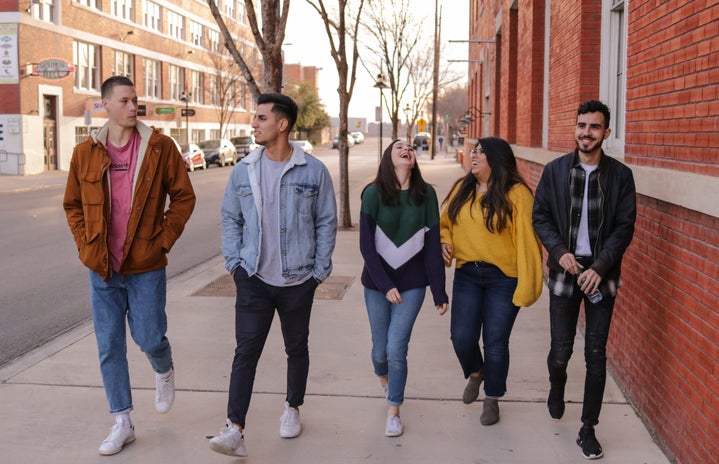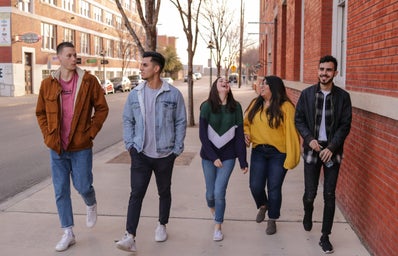I’ve always been a reader. Though I’ve moved onto Henry James and William Faulkner, I can still remember the first “chapter book” I ever loved (The Incredible Journey by Sheila Burnford) and the first one I ever truly hated (Island of the Blue Dolphins by Scott O’Dell). It takes a lot for me to really dislike a book – honestly, you just need one island and several blue dolphins. But, as bright and promising as any of us were back in high school, sometimes
But who doesn’t begin to hate absolutely everything after being trapped in the same building, with the same people, doing the same thing, day after day after day for four years? That’s enough to make anyone want to pull a Bradbury and burn a book or two. Maybe, just maybe, all that teenage angst kept you from giving Hemingway or Joyce or Angelou a fair shake.
If you’ve graduated onto shunning the literary greats into the shadows of your mind, if you think my literary research sounds insufferable, if you get hives every time you stand too close to anything marked “fiction,” here’s a list of 12 books from high school that you maybe, possibly, just might want to consider giving a second chance:
1. The Scarlet Letter – Nathaniel Hawthorne
“The scarlet letter was her passport into regions where other women dared not tread. Shame, Despair, Solitude! These had been her teachers – stern and wild ones – and they had made her strong.”
When I think of this book, I think of when my stepfather told me that this is the only novel that ever literally put him to sleep. But, far from boring, the story of Hester Prynne’s persecution spurs readers to consider the societal factors that shape us as individuals. What larger systems teach us the difference between right and wrong, good and bad? Plus, the feminist undertones we see with a modern-day reading are only an added bonus to an already enthralling morality tale.
2. The Catcher in the Rye – J.D. Salinger
“It’s funny. Don’t ever tell anybody anything. If you do, you start missing everybody.”
More often than not, high schoolers – at least those that actually make it the whole way through – dig on this book. Salinger nearly gives justification to their teenage angst with the infamous Holden Caulfield. And yet, caught up in the I’m-so-much-better-than-you mindset that an initial reading has a tendency to grant, you miss the complex lessons Salinger has to give regarding personal identity, belonging, loss of innocence and emotional, human connection. Give it another try. See if you can finally reach the gold ring.
3. Angela’s Ashes – Frank McCourt
“You might be poor, your shoes might be broken, but your mind is a palace.”
With a mix of humor and despair (and a healthy dose of alcoholism), it’s surprising that Frank McCourt’s memoir of his life in poverty-ridden Ireland isn’t a hit-and-win every time. Sure, he may be a little long-winded. And, sure, the dialect can be a little tricky to navigate, along with the total disregard for proper grammar. But the wisdom McCourt offers regarding persistence, struggles with religion and the inevitability of death are powerfully underrated.
4. 1984 (or Animal Farm) – George Orwell
“Who controls the past controls the future. Who controls the present controls the past.” – 1984
Animal Farm is for freshmen, while 1984 is for seniors. And, in either case, it’s bad timing. Today’s political climate is nothing less than primed for a second look at Orwell’s teachings. Based on the totalitarian states of Germany and Russia, so familiar to the author’s audience in 1948, there are lessons still to be learned about the reliability of knowledge, the malleability of the collective mind and the ever-pressing need for awareness. Oh, and slaughter. Just depends on whether you’d rather see that enacted on piglets or people.
5. Death of a Salesman – Arthur Miller
Capitalism, man… That’s all I have to say.
6. Lord of the Flies – William Golding
“Maybe there is a beast… Maybe it’s only us.”
Golding and Orwell were sorta in the same boat when it comes to wanting to kill Piggies. I’m sorry. I just finished typing that sentence and now I feel like a terrible person. He was the only good one! The only human one left! What a bunch of little animals! (Then again, maybe that’s what Golding was trying to say.)
7. Of Mice and Men – John Steinbeck
“Because I got you an’—”
“An’ I got you. We got each other, that’s what, that gives a hoot in hell about us.”
Set in the American West during the Great Depression, this is Steinbeck’s musing upon the futility of the search for the American Dream. George and Lennie, migrant workers in California, muse dreamily about a fantasy that can never be achieved. Steinbeck has a way of making any reader feel fragile, needy and on the verge of despair. But, yanno, like… in a good way? But in the midst of all this misery, there are still questions to be asked. Is it okay to kill? Can we really achieve happiness? And, more than anything, is $2.50 enough to pay for sex? Seriously, Steinbeck. Gross.
8. Literally, anything by Shakespeare
“Hell is empty and all the devils live here.” – The Tempest
Okay, fine. Start with Romeo and Juliet, but move into the big leagues after that. Don’t make Willy Shakes feel underappreciated. Life as the Bard can be hard.
9. Jane Eyre – Charlotte Brontë
“Reader, I married him.”
Okay, hear me out. I SAID HEAR ME OUT. Yes, she is long-winded. Perhaps very long-winded. But what do you want? She is a Brontë. Try Wuthering Heights for a few chapters, and you’ll be glad to return to tried-and-true Jane. The Victorian era was known for its repression of women through social constructions, and this is Brontë’s way of fighting back with an exploration of individualism, classism, sexism and religion. Brontë was truly ahead of her time in the world of proto-feminism.
10. The Awakening – Kate Chopin
“I would give up the unessential… but I wouldn’t give myself.”
“What’s worse than drowning in the ocean? Men!” – Kate Chopin, the early feminist comedienne
11. Heart of Darkness – Joseph Conrad
“We live as we dream—alone…”
I’ll give a fair warning: this book is intense. It’s difficult. It’s wordy. And you probably will quit it a few times before following through. But, when you eventually get into the heart of it, you’ll be overwhelmed with Conrad’s insights regarding man’s capability to commit the most atrocious of evils and the effects of man’s interference in the natural world. Plus, decapitated heads on sticks and cannibalism. Conrad was not the man to mess with.
12. Their Eyes Were Watching God – Zora Neale Huston
“Two things everybody got tuh do fuh theyselves. They got tuh go tuh God, and they got tuh find out about livin’ fuh theyselves.”
As a black woman growing up in pre-civil rights America, the main character, Janie, knows a little bit about struggle and overcoming odds. Her personal growth throughout Hurston’s work is almost unprecedented in terms of maturation, and she manages to find her own way of taking ownership of both her femininity and her blackness. Janie grows from a reckless teenager, to a woman “with her finger on the trigger of her own destiny.” And we seem to grow right along with her.


